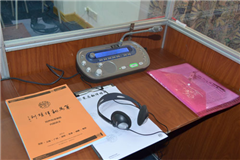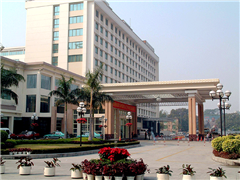
 |
|

外语在外交工作中所起的作用
2014-05-26 14:57外交工作是代表国家进行对外交往,维护国家主权和领土完整,维护国家和人民的利益,了解对方,宣传自己。
英语已成了世界通用语,“Lingua Franca”。通过学习和掌握外语,了解外国,学习外国的先进科学技术、管理经验,准确地介绍中国,扩大交流与沟通,提高自己的水平和素质,为维护国家和民族利益而服务,同时也能改善自己的物质生活水平。
学习外语,须注意的两个问题:
一、 扩大知识面
二、 注意政治
一、扩大知识面 Broaden the Horizon of Knowledge
学习外语,不能只学语言,而要掌握各方面的基本知识,政治、
经济、军事、文化、社会、法律、科技、宗教、医疗卫生等各个方面。要紧跟时态的发展,随时熟悉和掌握有关的知识和词汇。举例:
(一)政治时事方面
与我国建交国166国,联合国成员 191。
甲午战争 Sino-Japanese war of 1894-1895
马关条约 Treaty of Shimonoseki(1895)
明治维新 Meiji Reform
靖国神社 Yasukuni Shrine
小泉纯一郎首相 Prime Minister Junichiro Koizumi
朝鲜半岛的非核化 Denuclearization of Korean Peninsula
轻水反应堆 light water reactor
伊拉克问题
什叶派 Shiites
逊尼派 Sunnies
库尔德族 Kurds,Kurdish
SARS Severe Acute Respiratory Syndrome
禽流感 Avian(Bird) Flu
飓风 Hurricane
台风 Typhoon
海啸 Tsunami
(二)经济
积极的财政政策 proactive financial policy
稳健的货币政策 prudent monetary policy
第三产业 tertiary industry
第一产业 primary industry
资不抵债 insolvent
CEPA(对港澳) Closer Economic Partnership Arrangement
外包 outsourcing=obtain goods or services by
contract from an outside supplier
股票的首次公开发行 IPO(Initial Public Offering)
数码鸿沟 digital divide
物流 logistics
假冒伪劣 fake (counterfeit) and shoddy(sub-standard) goods
(三)宗教
佛教 Buddhism
大乘 Great Vehicle( Mahayana)
小乘 Little Vehicle(Hinayama) (or Theravada)
阿弥陀佛 Amitabha( Sanskrit)
意谓“May Buddha preserve us, merciful Buddha.”
南无阿弥陀佛 Namo Amitabha (Blessed be or Glory to Amitabha)
观世音 Ava Lokitesvara or Goddess of Mercy
罗汉 Arhats
天王 Lokapala
文殊 Manjuori
普贤 Samantabhadra
韦驮 Veda
基督教 Christianity
分天主教Catholicism;
耶苏教即新教(Protestantism);
东正教 Eastern Orthodox(俄罗斯、中亚、东欧),教堂为church
伊斯兰教(即回教)Islamism, Muslims
教堂为mosque
道教 (Taoism)
儒教 (Confucianism)
犹太教 Judaism
教堂为synagogue
(四)港澳用语
黑社会 triad
紫荆花 bauhinia
按揭 mortgage
杯葛 boycott
(五)医疗卫生
健忘症 amnesia
老年痴呆症 Alzheimer’s disease
精神分裂症 schizophrenia
核磁共震 MRI (magnetic resonance Imaging)
避孕套 condom
基因 DNA
(六)英、美的不同
英美两国的社会、文化习俗不同,由此而产生不同的词汇和用法。例如:美国人的用语中有一个词:“Monday-morning quarterback”。 “ Quarterback” 是橄榄球队中的后卫,负责指挥本队的进攻。橄榄球赛一般在周末举行,球队往往于比赛后的星期一召集队员对上周的比赛进行总结,由“quarterback”来评议上周进攻中的优缺点。因此,“Monday-morning quarterback”就转化为“事后诸葛亮”或“放马后炮”之义。
又如,“ Dormitory ”一字,在英美均指“宿舍”。不同的是,英国人是指“宿舍房”(a room);美国人是指“宿舍楼”(a building)。因此,当一位美国教员对英国教员谈起,在美国大学里,男女学生都睡在一个dormitory里,英国人感到十分惊讶,因他对“ dormitory ”一字的理解是“同一个房间”。
又如,英国国名的全称是the United Kingdom of Great Britain and Northern Ireland”。英国的简称是Britain or U.K.因此, “Britain” is greater than “Great Britain”, & still greater than England.
“Pavement”英国人指“人行道”,美国人则指“大街”(Public thoroughfare)。“假期”英国人叫“holiday”,美国人则指 “vacation”。 “足球骚乱”,美国人叫“football holiganism”,英国人则叫 “soccer riot”.
二、必须注意政治
我们是中国人,需要介绍和宣传中国,维护祖国的尊严。我们要注意自己的政治立场、政治方向、政治敏感。外事工作者更是如此。周总理对外事工作者的要求是:“站稳立场,掌握政策,熟悉业务,严守纪律”。
目前,在台湾问题上的斗争十分激烈,我们必须注意维护“一个中国”的立场,尽量避免引起“两个中国”“一中一台”“台湾独立”含义的译法。
例如,“中国大陆”应译成“China’s mainland”,不要用Mainland China”。
对“台湾”的提法,好是“中国台湾”,即“Taiwan, China”。在APEC等国际组织里,“香港”的名称是“Hong Kong, China”(中国香港)。台湾的名称是“中国台北”“Chinese Taipei”。APEC有21个成员,其中包括香港和台湾,因此不能说21个成员国,而只能称21个经济体(economies),21个member economies.
“台湾问题”不要译“Taiwan issue”,而应称“Taiwan question. ” 台湾不是一个“issue”,而是一个历史遗留下来的“question”. The Taiwan question has been made an issue by the Americans.
注意中美联合公报中,“承认”一词的英文: “The U.S.A recognizes the Government of PRC as the sole legal Government of China.”(美国承认中华人民共和国政府是中国的唯一合法政府) 。“The Government of the U.S.A acknowledges the Chinese position that there is but one China and Taiwan is part of China.”(美国政府承认中国的立场,即只有一个中国,台湾是中国的一部分。) “Acknowledge”是“认识到”,与“recognize”不同。
“国籍”是“nationality”。“民族”不是“nationality”,而是“ethnicity”。56个民族应为56个“ethnic groups”。汉族不能译“Han nationality”, 应为“ethnic Han”。民族政策是“policy towards ethnic minorities.”
“国内外”与“海内外”有区别,一个是“at home & abroad”,一个是“at home and overseas”(包括港、澳、台)。华侨是Chinese nationals(中国籍的华人)。华人是overseas Chinese(包括美籍华人)。
“唯一合法政府”应译为“sole legal government of China”。“合法”一词应译为“legal”,意谓“sanctioned by law or in conformity with the law”。其他用语均不够有力,如“lawful”,其意close to “allowable or permissible” or to “rightful or proper”。 “Legitimate” 更不妥,因为it only implies recognition or acceptance by custom, tradition or the proper authorities or logical admissibility.
在外事翻译中,必须注意掌握用词的政治含义和政治分寸。在外交场合或国际会议上,常为一个字或词的用法和取舍争执不下,有的甚至成为长期悬而不决的争端。
例如:“Territories” 和“the territories” 不同。前者可指部分领土,后者指“全部领土”。关于中东问题的安理会242号决议中,英法两种文本就出现了长期未决的争议。英文是 “Withdrawal from territories occupied by Israel.”法文是“des territoires occupè.”
中英关于香港问题的联合声明(Joint Declaration)中,“交还”一字,英文用“restore”,这是我方坚持的,英国人原用“return”。因为“restore”的意思是“give back something that has been taken away or lost.”
“The Government of U.K. will restore Hongkong to PRC.”开罗宣言(1943)规定把日本侵占中国的领土,如东北、台湾、澎湖列岛等归还中国。“归还”一词英文是“restore”。
“香港特别行政区享有行政管理权、立法权、独立的司法权和终审权。”“享有”一词英文译为“vested with”。 “The HK SAR will be vested with executive, legislative and independent judicial power, including that of final adjudication.” “Vested with”说明权力不是固有的,而是中央政府授与的。
联合声明中,一概用“will”,不用“shall”。因为声明中是中英双方宣布各自准备做的事,而不是 “条约”款式。
“香港特区成立后,不实行社会主义的制度和政策。”中文里只有一个“社会主义”,英方坚持要用两个“socialist”, “After the establishment of the HK SAR the socialist systems and socialist policies shall not be practised in the HK SAR.”
“Safety” 和“Security”含义不同。“Safety”是指“人身安全”,“ security”则包括“政治安全”。“民族”应译“Nation”还是“people”? 犹太民族如译成“Jewish nation”,就有“犹太国家”的含义。
“Pretext”与“Excuse” 中文同为“借口”,但含义不同。
“Pretext ”is a fictitious reason given in order to conceal the real one, a specious excuse, a pretense.
“Excuse” is an explanation offered in defense of some fault or offensive behavior or as a reason for not fulfilling an obligation.
“Sorry”与“ Apology” 的不同。在美方撞机事件中,我方要求美方道歉,美方不肯用“ apology” 一词,只能用“sorry”一词。“Sorry”有两种意思,一种是“apologizing to someone for something that you have done which has upset them or caused them difficulties”; 另一种是“feel sadness, regret or disappointment about a situation”。为求得妥协,我方接受了美方用的“very sorry”,中文表达为“深表歉意”。








 在线咨询
在线咨询 正规学校
正规学校 助学补贴
助学补贴 优质服务
优质服务